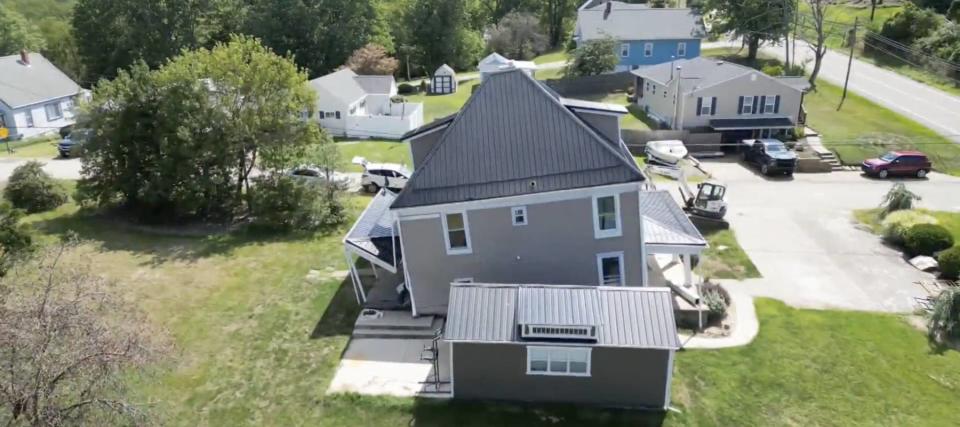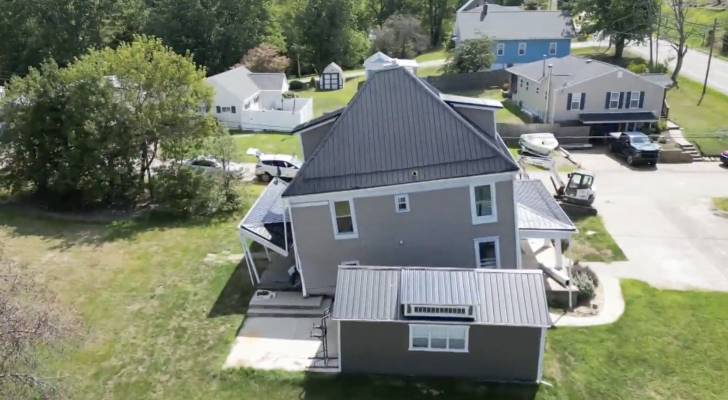
Homeowner Rick Cameron spent three years investing tens of thousands of dollars in renovations to his family home, only to watch it collapse.
After Cameron, an experienced construction worker, replaced the roof, stairs, walls, floors and kitchen, he began work in the basement when the walls of the house began to collapse.
“We've done a lot of renovations, both inside and out, but recently we decided to dig into the basement to get some more headroom… and then something happened,” Cameron told KDKA News in Carroll Township, Pennsylvania.
Don't miss it
Cameron’s crews rushed to evacuate his wife and five children from the house and added supports to reinforce the walls, but the collapse worsened. Now the house is a total loss, and Carroll Township, where the family lives, says it must be demolished.
“It's hard to watch,” Cameron said. “Every time I think about when I'm going to have to tear it down, it's going to be hard.”
To make matters worse, the Camerons are in a fight with their insurance company, State Farm, after receiving a letter saying they wouldn’t cover the damage. But they’ve been proactive. Here’s how they handled the situation and what you can do if it happens to you.
The insurance company has not responded
After Rick received the denial letter, he hired a public adjuster, Stephen Hnat, to help. Public adjusters are independent insurance professionals who are trained to help people navigate the homeowners insurance claims process.
“The first thing I do is basically read the policy to see what he's entitled to,” said Cameron's expert, Stephen Hnat. “It became a real struggle just to talk to (State Farm).
“We asked them multiple times to, you know, explain your position on this, and they just refused,” he added. “(The insurance rep) didn’t want to comment. He didn’t want to do anything.”
Even though Cameron and his crew did the work, the damage is covered by their policy. According to the adjuster, Cameron’s policy includes additional coverage for collapse during construction. Even if the crew is partially at fault, the policy should cover the damage as long as it’s not intentional.
The Camerons are now waiting to see if State Farm will cover the loss as they plan to demolish their beloved home. The family has moved into a nearby rental while they wait for the next steps.
Read more: These 5 Magical Money Moves Will Boost Your Net Worth in 2024 — and You Can Complete Each Step in Minutes. Here's How
How to File a Homeowners Insurance Claim
The Camerons’ coverage covers collapses caused by construction, so they’re hoping State Farm will approve their claim. If not, they’ll have to pay for the demolition and rebuilding themselves. If they still have a mortgage or construction loan, those payments will continue, too.
It can be tricky to settle a homeowners insurance claim, but there are ways to protect yourself. First, understand your policy’s coverage. If you’re planning on building, check to see if it covers construction-related damage. When hiring a contractor, ask to see their certificate of insurance, as this can provide additional protection.
Before you clean up, take detailed photos and videos of the damage and create a digital file with documentation of when, where, and how it happened. This can help when filing a claim.
Get multiple quotes from contractors to estimate the repair costs, which can strengthen your negotiations with the insurance company. If the insurer's quote is too low, multiple quotes can help your case.
Be sure to file a claim promptly, as some insurance policies have strict time limits. If your claim is denied, ask for a written explanation and the specific policy language used for the denial.
Finally, consider hiring a public adjuster if the claim is complicated or if the insurance company's estimate needs to be higher. They will represent your interests and can negotiate with the company for a fair settlement.
What you should read next
This article provides information only and should not be taken as advice. It is provided without warranty of any kind.

